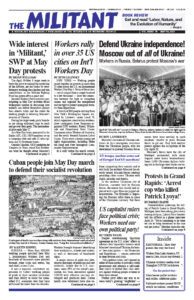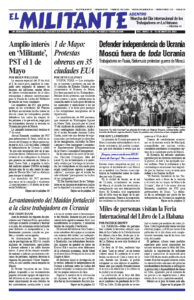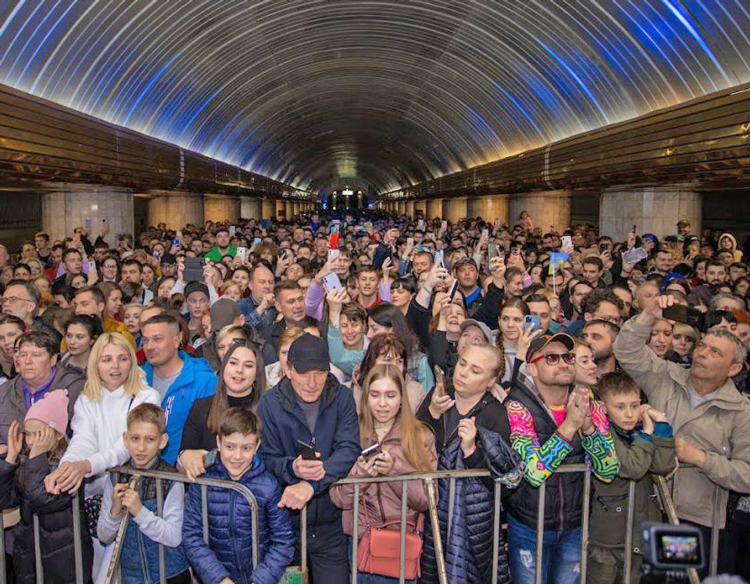Moscow’s invasion of Ukraine continues to face courageous resistance from the Ukrainian people, who are determined to prevent Russian forces from conquering their country and to win back the territory Moscow has already seized. Russian forces continue pounding cities across Ukraine with shells, missiles and bombs.
In the southern Ukrainian city of Kherson, currently held by Russian forces, the mayor was ousted and replaced with a pro-Moscow puppet administration. The Kremlin is imposing the Russian ruble there in place of the Ukrainian currency. But these moves have done nothing to quell residents’ resolve to press Russian forces to get out. They held another protest against the occupation of the city April 28.
Moscow’s forces have the city of Mariupol surrounded, with many trapped under heavy bombardment. Some 2,000 Ukrainian fighters holding out in the huge steel works are resisting a complete takeover of the city, accompanied by many civilians.
The Kremlin has sent units, depleted from defeats in conflicts around Kyiv, the capital, to the east and added fresh conscripts. But Ukrainian resistance and counterattacks have blocked Russian forces from linking up to encircle Kyiv’s forces.
“The Socialist Workers Party is for the defeat and withdrawal of Moscow’s troops from Ukraine,” Alyson Kennedy, SWP candidate for governor of Texas, said May 3. “The defense of their sovereignty by working people in Ukraine has inspired solidarity from workers and farmers all over the world, from Russia to the United States.”
Ukraine secured independence in 1991 when the Stalinist regimes across the former Soviet Union disintegrated. The mass uprising in 2014 that ousted the pro-Moscow regime of Viktor Yanukovych and the subsequent seizure of Crimea by Moscow, reinforced support for the country’s sovereignty among millions. But the yearning for independence goes back much further.
For centuries the Ukrainian people were subjugated under the rule of the Russian czars.
The workers and farmers government that came to power following the Bolshevik-led 1917 Russian Revolution granted Ukraine self-determination. In the years that followed, the Red Army fought to liberate Ukraine from counterrevolutionary forces trying to reimpose the rule of the landlords and capitalists. That victorious struggle and the impact of the overturn of capitalist social relations in the east deepened feelings of national pride among all Ukrainian working people.
Those gains were overturned in a counterrevolution headed by Joseph Stalin. Today Putin’s capitalist regime is trying to crush Ukraine. He wants to restore the prison house of nations like under czarism, with himself at its head.
US rulers use war to boost interests
Weeping crocodile tears for Ukrainian people, the U.S. and other imperialist rulers from Germany to Australia are sanctioning Russia and using the war to expand rearmament programs in preparation for future conflicts and wars. At the same time, they say price hikes and job losses at home are a product of Putin’s war, and they demand greater sacrifices by working people.
“The SWP demands the U.S. government gets its forces and nuclear weapons out of Europe,” Kennedy said. “We also oppose the sanctions, which, whoever they target, fall heaviest on working people in Russia. They cut across building solidarity between working people here, in Ukraine and in Russia.”
Added to the mounting costs of the war, annual consumer inflation in Russia rose to nearly 17% in March, the biggest rise since 1999 as economic output shrinks.
Russia’s giant state-owned Gazprom cut off natural gas piped to Poland and Bulgaria April 27 after the two governments refused Moscow’s demand to pay in rubles. The Kremlin threatens to extend this action to other countries in Europe that don’t comply.
Moscow’s Jew-hatred
In a Jew-hating tirade, Russian Foreign Minister Sergei Lavrov compared Ukrainian President Volodymyr Zelensky, who is Jewish, to Hitler May 1. He added, “The biggest antisemites are the Jews themselves.” The next day, Israeli Foreign Minister Yair Lapid condemned Lavrov’s remarks as “an unforgivable and outrageous statement as well as a terrible historical error.”
The Kremlin then attacked the Israeli government for “supporting the neo-Nazi regime in Kyiv,” echoing slanders made by Putin at the start of the war.
Up to now the Israeli government has been careful not to criticize Moscow, hoping Putin will continue to acquiesce to Israeli forces’ attacks on Tehran’s militias based in Syria that threaten Israel.
A March 3 statement by Jack Barnes, national secretary of the SWP on behalf of the party’s national committee, explains Putin is “himself a product of Russia’s notoriously Jew-hating secret police, formerly called the KGB.” The statement notes that Russian missiles desecrated a Jewish cemetery March 2, at Babyn Yar, the site of the slaughter of more than 30,000 Jews by Nazi forces during World War II.
In Belarus, opposition is growing to President Alexander Lukashenko’s backing for Putin’s war. In 2020 strikes and mass protests swept the country after Lukashenko falsely claimed that he won the presidential election. The protests were brutally suppressed by his regime with backing from Putin.
But since the war began hundreds of Belarusians have signed up to fight alongside Ukrainian forces to repel Putin’s invaders, and as a way to strike a blow at Lukashenko as well. Others disrupted rail lines supplying Putin’s forces.
Belarus, Russia, Ukraine unions
The Belarusian Congress of Democratic Trade Unions condemned Moscow’s invasion and calls for “the withdrawal of Russian troops from Ukraine, as well as from Belarus.”
Police arrested some 20 leaders of the independent Belarusian union April 19.
The Confederation of Free Trade Unions of Ukraine praised the jailed unionists for their stand and called for their release, as did the Confederation of Labor of Russia, which opposes Moscow’s invasion of Ukraine.
“Intensification of the conflict threatens a devastating shock,” the Confederation of Labor of Russia said in a statement, which “would open the door to a massive wave of breaches of working citizens’ labor rights.”
The Putin regime tried to quell countrywide protests at the beginning of the war, arresting thousands, including hundreds in Novosibirsk, a Siberian city of 1.5 million, 2,000 miles east of Moscow. Everywhere, those taking action faced not only fines and detention but getting fired from jobs or expelled from studies.
Despite this, students, teachers and other employees at Novosibirsk State University issued a public appeal calling for an immediate end to the war, the withdrawal of Russian troops and an investigation of war crimes by the Kremlin. By April 27, 133 people had signed the appeal, with numbers growing since, including several members of the Russian Academy of Sciences.
A garbage collectors strike in the city at the end of April over the doubling of workers’ hours without pay went on for days, undeterred by Putin’s wartime clampdown.


